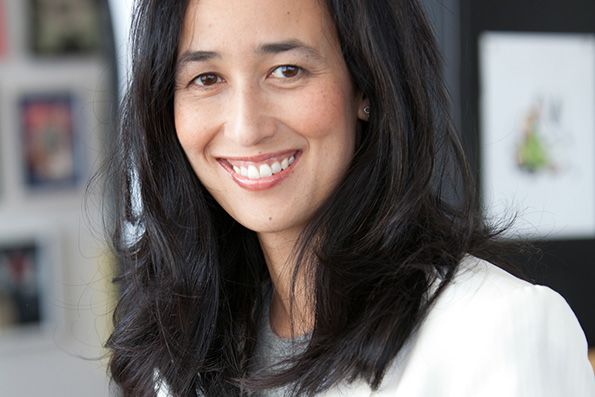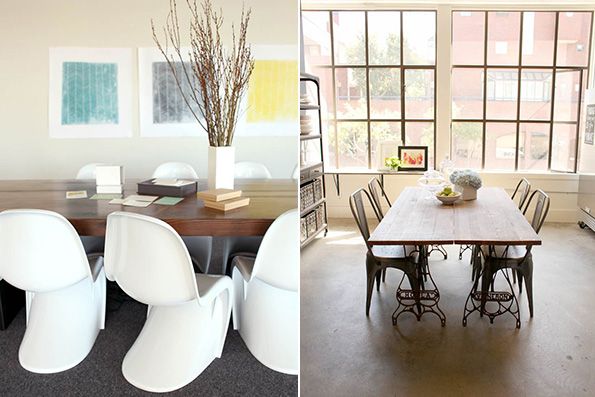Mariam Naficy’s story reads a lot like an Internet fairytale: In 1998, a 20-something Stanford MBA comes up with groundbreaking idea for an e-commerce cosmetics company, sells it for $100 million right before the bubble bursts, takes off for a few years and then launches another e-commerce company in 2008 only to again achieve wild success for herself and her investors.
If you think this kind of success would create a cold, unapproachable entrepreneur, than you haven’t met Naficy. On the contrary, she's a lighthearted and cheerful mother of two who exudes peace during every interaction. Naficy, now in her early 40s, carries this energy into her office at Minted, a stationery and art e-tailer that allows customers to vote on independently created designs to determine what the company should sell on the site. She works alongside 115 colleagues out of an office in San Francisco’s Financial District.
Naficy recently sat down with OPEN Forum to discuss her path to entrepreneurship and some of her biggest challenges to date.
Did you always know you wanted to be an entrepreneur?
Oh, gosh, no. I don’t even think I heard the word "entrepreneur" as a kid. My mom came from a family of artists and my dad was a development economist for the UN.
What did you originally imagine yourself doing for work?
I was going to be a lawyer. I graduated from Williams College [in Williamstown, Massachusetts] and then worked at Goldman Sachs as a management consultant for a while until I followed my boyfriend/now husband to California. That moved changed everything for me.
What happened when you moved to California?
We moved to the Bay Area in 1993, right around the time when the Internet was emerging. There were a ton of companies launching, a lot of people taking major risks and I identified with that. I felt like it was a great personality fit for me. I decided to start a business, but not before I went to graduate school. As a woman, it helped raise my credibility when I went to raise money later on for Eve.com.
What was it like to launch Eve.com, your cosmetics e-commerce startup, in your late 20s?
I was lucky because I had some connections to venture capital firms from my time at Stanford, but it was still difficult. My co-founder, Varsha Rao, and I worked as hard as we could to secure meetings and to convince people of our idea. We ended up landing $26 million in 18 months, which was a lot, but back then it was another time and everyone was raising crazy money.
How did you feel after you sold Eve.com just a few years later?
I was glad it happened how it did, but I was also feeling extremely risk adverse because of how many companies were shutting down. It was really depressing in San Francisco in 2000. Everyone was saying the Internet was over.
Did you agree that the Internet was done for?
I thought growth would slow substantially in terms of new products for the Web, which sounds funny now. But there were a lot of people who really thought the Web was dead forever. I had to leave. We moved to L.A. for two years. I worked for another company and then came back to San Francisco in 2003 to run The Body Shop’s e-commerce division and left to start Minted about four years later.
In 2008, crowdsourcing wasn’t really a thing. How did you think of the idea for Minted where consumers would vote on designs for sale consideration on the site?
While I was at The Body Shop, I started to see a substantial shift in consumer behavior, especially when it came to traditional media. People who were perceived as "experts" were being disrupted by unknown bloggers. Since this crowd curation of new content providers was coming up, I thought it could be applied to product design.
What challenges have you faced with Minted?
I started Minted by myself and raised a $2.5 million angel round in late 2007, which gave me the ability to hire about 10 to 15 people right off the bat. The problem, though, was our business plan. It was flawed and we didn’t know it.
What happened?
We launched in April 2008 as a site that offered branded stationery products and crowdsourced products. We were basically spending all our money on the branded products and no one wanted to buy them. I don’t think we sold anything in April 2008. I thought about closing the company altogether, but I didn’t want to let my investors down, so I powered through and tried to figure a way out of the mess we’d created.
We pivoted from a blended approach to an entirely crowdsourced model and saved the company. There have been other challenges, though. We’ve almost run out of cash many times. And once we basically ran out of paper in the height of the holiday season with weeks worth of orders on the books. We had to get on the phone to the head of the paper company and beg them to give us every last ream.
Wow, have you slept much in the past six years?
[Laughing] Not that much. But it's okay. Minted is a labor of love for me.
What advice would you give young entrepreneurs just starting out?
Surround yourself with quality people and don’t compromise on your definition of what quality looks like. If you’re a technologist looking for someone on the business side, figure out what great looks like. If you need an engineer, figure out what the best engineer looks like and don’t compromise on that, ever.
You’ve been quoted as saying that you're always thinking about your next company while in your current one. What's next for you after Minted?
That quote no longer holds true for me. This time I’m not thinking about another thing. I’m completed obsessed with this company and see myself staying here for a very long time.
Read more articles on e-commerce.
Photos: Courtesy Minted







